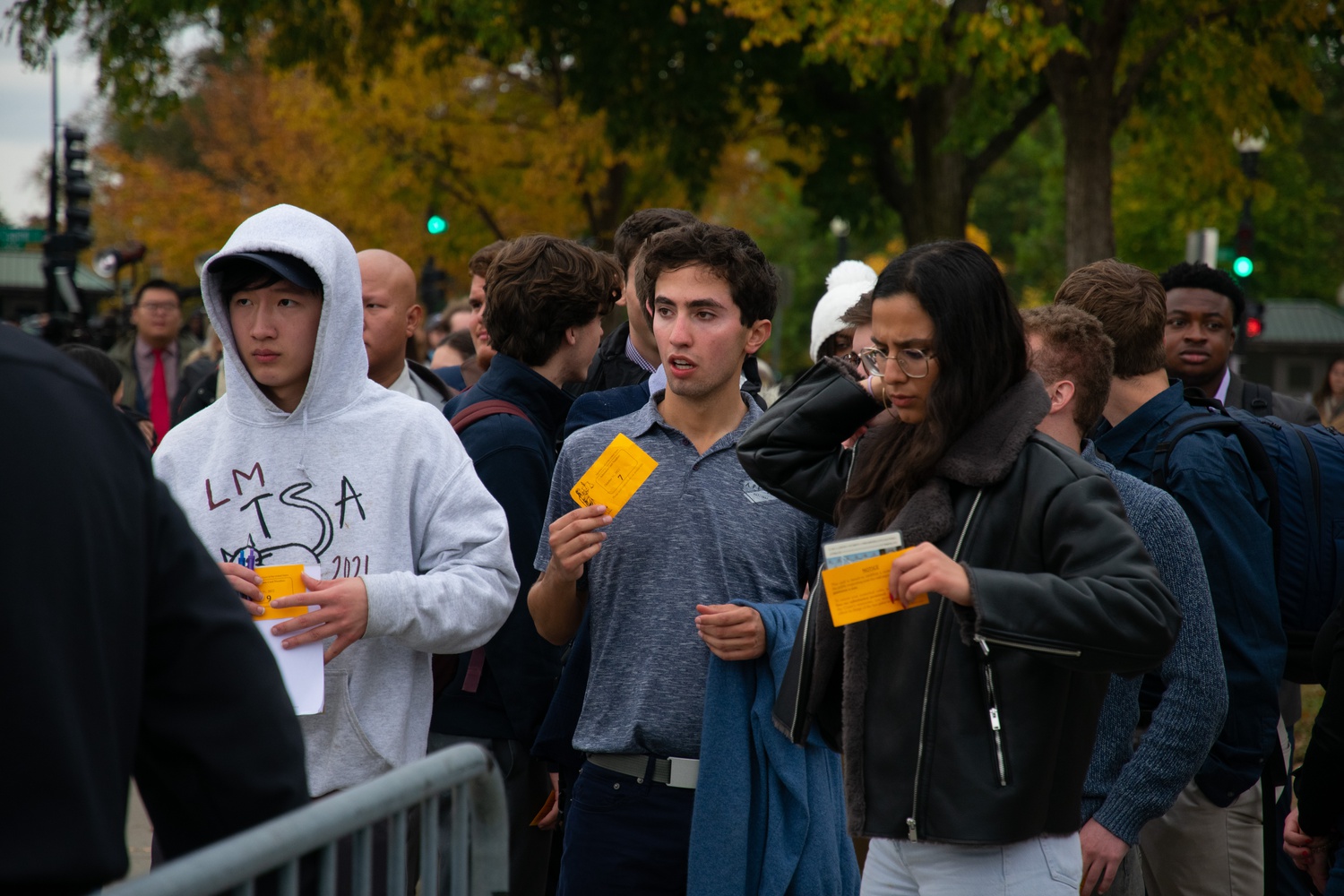
News
Harvard Grad Union Agrees To Bargain Without Ground Rules

News
Harvard Chabad Petitions to Change City Zoning Laws

News
Kestenbaum Files Opposition to Harvard’s Request for Documents

News
Harvard Agrees to a 1-Year $6 Million PILOT Agreement With the City of Cambridge

News
HUA Election Will Feature No Referenda or Survey Questions
Hoping for a Front Row Seat to History, Swarms of Students Lined Up Early Outside Supreme Court Monday

WASHINGTON — Salimah Khoja, a law student at the City University of New York School of Law, first arrived outside the Supreme Court Saturday evening in hopes of securing a spot at Monday’s hearing.
The Supreme Court heard oral arguments Monday for a pair of lawsuits against Harvard and the University of North Carolina brought by anti-affirmative action group Students for Fair Admissions. The group alleges that the schools’ admissions programs are unconstitutional for their consideration of race.
On Saturday, Khoja learned only the first 50 people in line would be admitted to view oral arguments at Monday’s hearing. The queue had not yet begun forming, so Khoja and her friends checked back periodically.
They were ultimately the first in line.
“We wanted to make sure that we would be guaranteed a spot, and so we started forming the line,” she said.
As lawyers representing Harvard, UNC, and SFFA prepared to deliver their oral arguments before the court, swarms of eager students descended on Washington this weekend for the chance to watch history unfold.
Three undergrads from George Washington University — who arrived outside the court Sunday evening — said they were relieved the line was not longer. By the time they arrived, roughly 15 people were stationed outside.
“For really, really big cases, people line up Saturday 5 p.m. for a Monday case,” said Reeya Patel, one of the students. “So we came to check it out yesterday, and there was nobody, absolutely nobody here.”
Jack A. Shapiro, a student from the University of Maryland, messaged two of his friends from high school and recruited three friends from UMD to spend the weekend in D.C.
“[Shapiro] sent me a text message about a month ago — three weeks ago — [that] said, ‘Hey, you want to camp out at the Supreme Court?’ Sounded like a blast,” said Matthew B. Eichen, one of Shapiro’s friends, who attends the University of Pennsylvania.
Shapiro and his five friends had arrived outside the court at 10:30 a.m on Sunday.
“We wanted to get there really early, because we thought there'd be a giant line,” said Jonathan R. Xu, one of the students. “I mean, there's a lot of people here but the line’s kind of developing.”
Line sitters traveled from across the country and around the world.
“Americans have such a different relationship to the law,” said Clémence Pautrat, an exchange student from the French university Sciences Po. “You sue for everything.”
Many campers came prepared to spend hours in line, with some donning sleeping bags and others lawn chairs. The Supreme Court did not permit people to bring tents.
Others were less prepared.
“Not everybody planned so well. We didn't bring any sleeping bags,” Gavin O’Malley, a student from American University. “Some people forgot chairs.”
Shapiro remarked on the physical state the campout left many attendees in.
“It's kind of sad because I feel like the Supreme Court is this super dignified, formal institution. But any civilian who gets in is going to be sweaty, tired, hungry,” Shapiro said. “So we're gonna do our best to freshen up but it's all right.”
Some attendees considered the sacrifices worth it. By 7 a.m. Monday, the line stretched around the block as dozens of pro-affirmative action protesters began rallying on the steps to the court.
Many of the sidewalk-dwellers passed the time chatting with one another.
“The single greatest feature of lining up to watch a Supreme Court case is talking to strangers,” Shapiro said. “I mean, literally, we got law students. This guy teaches at Johns Hopkins. I saw a guy walking by who has a Ph.D., who works for NASA, lives around the corner. This guy is an alum of UNC.”
“You meet all sorts of people. And that's the beauty of coming out here,” he said.
—Staff writer Rahem D. Hamid can be reached at rahem.hamid@thecrimson.com.
—Staff writer Nia L. Orakwue can be reached at nia.orakwue@thecrimson.com.
Want to keep up with breaking news? Subscribe to our email newsletter.
Most Read
- 3 Harvard Students, 2 Recent Grads Had Visas Revoked
- It’s Time To Disband the PSC — Permanently
- Harvard Advises International Students To Reconsider Travel, Assess Risks From Pro-Palestine Speech
- As Trump Waits for Harvard’s Reply, Governing Boards Meet in Harvard Square
- Billionaire Investor Gerald Chan Under Scrutiny for Neglect of Historic Harvard Square Theater
